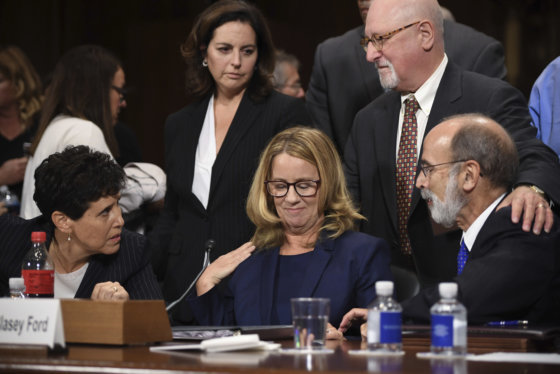WASHINGTON — The FBI is investigating, lawmakers are sniping and the nation is watching. So when will a final vote be taken in the Senate on Supreme Court nominee Brett Kavanaugh?
On Tuesday, Majority Leader Mitch McConnell (R-Ky.) renewed his pledge to vote this week. But exactly what day that would be is still unclear.
“After the FBI shares what they’ve found, senators will have the opportunity to vote,” McConnell said. “They’ll have the opportunity to vote ‘no’ on the politics of personal destruction. They’ll have the opportunity to vote ‘yes’ on this fine nominee.”
The FBI investigation into allegations of sexual misconduct against Kavanaugh — all of which he’s denied — is the crucial factor in determining when a vote could begin. At the request of Sen. Jeff Flake (R-Ariz.) and other lawmakers, the Senate last Friday agreed the FBI could investigate for up to a week, meaning its deadline is this Friday. But the FBI could complete its interviews at any time.
Even if the FBI quickly wraps up, the Senate’s procedural process would need to start up within the next couple of days for a final vote to come by the end of the week.
Republicans have accused Democrats of trying to drag out the confirmation process, with McConnell repeatedly charging they’re trying to “move the goalposts.”
Minority Leader Chuck Schumer (D-N.Y.) denied that in a Senate floor speech Tuesday.
“No Democrat has called for taking more than a week. We are not moving the goalposts back,” Schumer said.
But just a few hours later, the ranking Democrat on the Senate Judiciary Committee, Sen. Dianne Feinstein (D-Calif.), told reporters that a Friday vote on Kavanaugh would be “too soon,” adding that it wouldn’t give lawmakers enough time to review the FBI probe.
The chairman of the committee, Sen. Chuck Grassley (R-Iowa), said Tuesday that he expected the FBI report to be released before Friday, but that he wasn’t sure exactly when.
Schumer has made a request to McConnell that all senators be briefed on the FBI’s findings at least 24 hours before a Senate vote to end debate on the nomination.
McConnell doesn’t want the wait for a vote to go on much longer. But he also can’t afford to be seen as rushing, in the wake of Flake’s request for the delay, which is supported by other key Republicans, Sen. Lisa Murkowski (R-Alaska) and Sen. Susan Collins (R-Maine).
Flake has said he will vote for Kavanaugh, while Murkowski and Collins have not announced what they’ll do. If all Democratic senators vote against Kavanaugh, Republicans — who have a 51-49 edge in the Senate — can only afford to lose one vote to get the judge’s confirmation passed.
The Senate has already let several earlier deadlines go by. Everything changed after Christine Blasey Ford agreed to testify at last week’s highly charged hearing on Capitol Hill.
And while the nomination process is moving forward, it remains fluid. There’s also Senate procedure, which takes time. Over a period of several days, McConnell would need to end debate on the nomination; provide a one-day waiting period; and then the Senate would need to vote on a cloture motion. That would open things up for the final Senate debate on the nomination, which can last up to 30 hours.
Kavanaugh first testified for his confirmation hearing before lawmakers on the committee nearly a month ago – Sept. 4.








